Text
小説の語彙力(1)

名詞 // Nouns:
基調(きちょう)basic tone, basic theme
後年(こうねん)in (one's) later years
権現(ごんげ)incarnation
酸味(さんみ)sourness, sour taste
駄洒落(だじゃれ)bad joke
店内装飾(てんないそうしょく)in-store decoration
末裔(まつえ)descendant
装い(よそおい)outfit
動詞 // Verbs:
あやす soothe, comfort, humor
利かせる(きかせる)season (e.g. with salt), bring out, use
渋る(しぶる)be reluctant, be unwilling, balk
なつく become emotionally attached
放る(ほうる)neglect, abandon, leave alone
形容詞 // Adjectives:
渋い(しぶい)bitter, sour, harsh, grim
その他 // Other:
後々(のちのち)later
機転が利く(きてん が きく)be quick-witted
散々(さんざん)severely, harshly
駄々をこねる(だだ)throw a tantrum
86 notes
·
View notes
Text
改まった形|Polite Forms
In formal settings like in a business meeting or at a public gathering some words are switched with politer forms. You often hear them when somebody is giving a speech, holding a presentation or on TV. But they appear in written form as well, especially in business context. Basically, everywhere where keigo is used, it is also expected to apply politer forms.
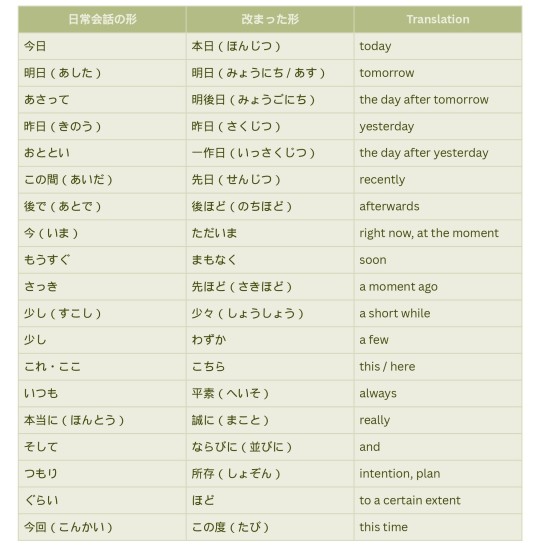
157 notes
·
View notes
Text
The 6 Differences Between は and が
DIFFERENCE 1
The important fact is AFTER は
• この犬は私のベットです。This dog is my pet.
You want to emphasize that this is not a stray dog. It is not someone else's pet dog. It is MY PET. So anything comes after は is the main part you want the listener to pay attention to.
The important fact is BEFORE が
• この犬が私のベットです。This dog is my pet.
You want to emphasize that THIS IS THE DOG that is my pet. Not other dogs. Imagine you're at a park and there are 3, 4 other dogs playing together with your dog and you want to tell your friend that THIS DOG is the one that is your pet dog, other dogs are not yours. So, what comes before が is the main part you want to tell the listener.
More examples:
• このケーキはおいしいです。This cake is DELICIOUS! (You want to tell your friend that this cake is indeed very good. Your emphasis falls on おいしい, so you use は, because the important fact is AFTER は.
• このケーキがおいしいです。THIS CAKE is delicious. (You want to tell your friend that among all the cakes on the buffet table, this particular cake you are pointing to is the most delicious one. Others are not good.) Your emphasis falls on この��ーキ (THIS CAKE), so you use が, because the important fact is BEFORE が.
DIFFERENCE 2
New information and things that you mention for the first time, use が. Old information or topics that have been mentioned earlier but is now repeated again, use は.
• 学校にマイクという男がいます。There is boy named Mike in my school.
You started the conversation with your friend by saying there's a new student named Mike in the school. That is the first time you mentioned Mike. It is new information, therefore use が.
• マイクはアメリカ出身です。Mike is from America.
You mention Mike the 2nd time now and it is no longer a new information. It is considered old information, therefore use は.
DIFFERENCE 3
Stating facts without adding your personal opinion or judgment use が. By adding your own opinion or judgment, use は.
• 外に猫がいます。There is a cat outside.
You are just merely stating a fact that there is a cat outside. This sentence doesn't include your description about the cat. No personal opinion or judgment about the cat.
• あの猫は白いです。The cat is white in colour.
You are putting your description, your judgment into the sentence about the cat. When you are adding your own thoughts, opinion, description about something, use は.
• 日本の料理はおいしいです。Japanese food is tasty.
You are putting your opinion/judgment about Japanese food in your sentence, therefore, use は.
DIFFERENCE 4
When you make comparison, use は. When you eliminate other options, use が.
• お茶は好きですが、コーヒーは好きじゃありません。I like tea but I don't like coffee.
DIFFERENCE 5
If two actions are done by the same person, use は. If two actions are done by two different persons, use が first, then use は for the second action.
• 私はごはんを食べるとき、テレビを見ます。I have my meal and I am watching TV.
• 私がごはんを食べるとき、父はテレビを見ます。When I have my meal, my father watches TV.
DIFFERENCE 6
To modify a phrase into a noun, use が.
• これは彼女が作ってくれたケーキです。
What cake is this? This is the cake that is baked by my girlfriend. The phrase 「彼女が作ってくれた」 is to modify the cake, to describe about the cake.
Quiz Time
• 部屋は広いです。
• 部屋が広いです。
In English, both sentences mean "The room is spacious." But what is the difference?
In 部屋は広いです, it shows a comparison contrast nuance (read DIFFERENCE 4). If you say this, the listener will believe that you are making a comparison of this room with all the other rooms in the house. You want to say this room is spacious, whereas the other rooms are smaller in size.
In 部屋が広いです, you are merely stating a general fact about this room being spacious (read DIFFERENCE 3). You are not making any comparison. Your sentence has no added personal judgement or opinion. You are stating a fact about the room being spacious.
155 notes
·
View notes
Text
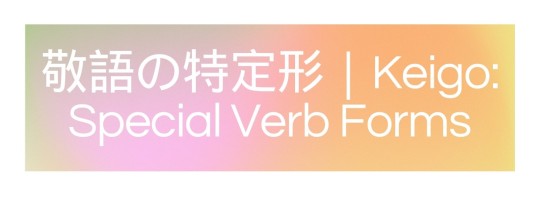
This post is an addition to 敬語の5分類|The 5 Types of keigo.
尊敬語の特定形
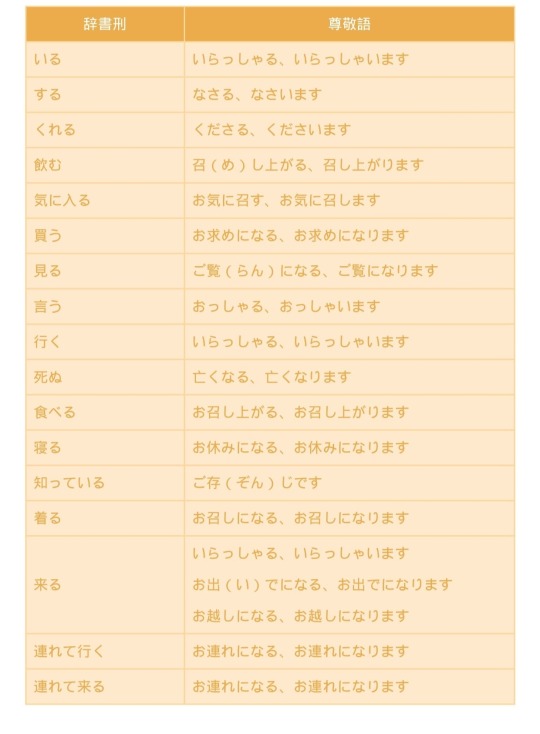
謙譲語Ⅰの特定形
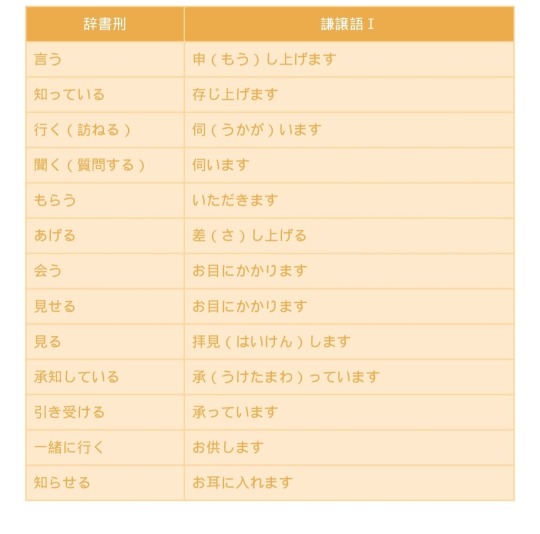
謙譲語Ⅱの特定形
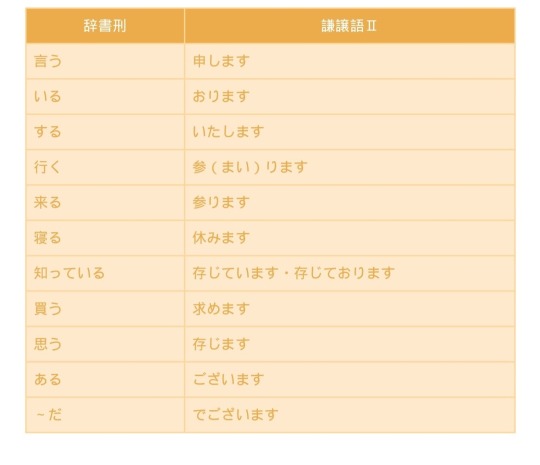
90 notes
·
View notes
Text
N5 文法: じゃいけない・ちゃいけない
じゃいけない・ちゃいけない= must not
Different versions depending on register:
てはいけない- formal
じゃいけない- standard
ちゃいけない- standard
ちゃダメ・じゃダメ- casual
How to use:
てverbs-
Use the verb’s て form, but then remove the て
たべる -> たべて -> たべちゃ
“taberu” -> “tabete” -> “tabe cha”
でverbs-
If the て form is で, then ちゃ turns to じゃ
のむ -> のんで -> のんじゃ
“nomu” -> “nonde” -> “nonja”
Examples:
寝る前にスマホを見ちゃダメよ。= You shouldn't look at your phone before going to bed
20歳未満の人はお酒を飲んじゃいけません。= people under 20 must not drink alcohol
128 notes
·
View notes
Text
文学作品から学ぶ語彙
名詞 // Nouns:
応酬(おうしゅう)reciprocation
咳払い(せきばらい)cough, clearing one's throat
沈黙(ちんもく)being silent
風貌(ふうぼう)looks, appearance
眼差し(まなざし)look, gaze
申し子(もうしご)child that was prayed for
動詞 // Verbs:
圧倒する(あっとう)overwhelm
後ずさる(あとずさる)back off
悟る(さとる)understand, comprehend
忍び込む(しのびこむ)steal in
たじろぐ wince, flinch, recoil
身を乗り出す(み を のりだす)lean forward
形容詞 // Adjectives:
異様な(いよう)bizzare
勤勉な(きんべん)diligent
ちょっとした slight, minor, trivial
間抜けな(まぬけ)stupid, idiotic
無秩序な(むちつじょ)chaotic
その他 // Other:
そうともさ! Exactly right!
その分(ぶん)to that extent
足らず(たらず)a little less than, just under
116 notes
·
View notes
Text
3 notes
·
View notes
Text
If you have doubts about the statement that I made a few days ago, I want to tell you something.
First of all, I get boring very easily, so when I want to be productive (like these all polyglots on youtube who study for eight hours a day) after a few days I become tired and it is possible that I will just give up. Obviously, I do a lot of exercises from textbooks, but when I don't feel like doing them, I just watch a dorama or video with grammar or vocab explanation.
Second of all, I'm also a tutor so I have to look for creative and interesting materials every day. Videos are the best option for homework because I can include a study material and interests of my students. If you're an ESL student like I was, you know that the best way to improve your language skills is by watching videos on topics you like or writing fanfictions lol - just by using the Internet.
Language learning should be all about fun and slow, but effective progress, not about speedrunning (I love speedruns tho).
It's your daily reminder that you should treat watching videos in your target language as a substantial part of your learning. No, studying from books is not 'more important' nor is watching films 'less important'.
77 notes
·
View notes
Text
It's your daily reminder that you should treat watching videos in your target language as a substantial part of your learning. No, studying from books is not 'more important' nor is watching films 'less important'.
#so yeah don't think that watching yt is a waste of time and it's 'cheating'#immersion baby#langblr#japanese langblr#studyblr#studying#study blog#study motivation
77 notes
·
View notes
Text
Free PDF Workbooks for Japanese, Spanish, Korean, etc. (30+ languages)

If you’re looking to practice a bit and remember your target language better… here are tons of free worksheets/workbooks for 34 languages (Japanese, Spanish, Korean, French, German, Italian, etc, etc.)
It’s the same type of “fill in the blank” workbook across all of their languages but the magic in actually rewriting things over and over is that the words end up sticking. Plus, there are English sections where you’ll have to force yourself to remember and write the word/phrase in the target language - which is even better for your memory (called active recall - forcing yourself to remember). I’m personally a big fan of this approach and I’d do similar to pass vocab quizzes in my HS & uni language classes.
If you’re interested, give these a go.
Afrikaans— https://www.afrikaanspod101.com/Afrikaans-workbooks
Arabic— https://www.arabicpod101.com/Arabic-workbooks
Bulgarian— https://www.bulgarianpod101.com/Bulgarian-workbooks
Cantonese— https://www.cantoneseclass101.com/Cantonese-workbooks
Chinese— https://www.chineseclass101.com/Chinese-workbooks
Czech— https://www.czechclass101.com/Czech-workbooks
Danish— https://www.danishclass101.com/Danish-workbooks
Dutch— https://www.dutchpod101.com/Dutch-workbooks
English— https://www.englishclass101.com/English-workbooks
Filipino— https://www.filipinopod101.com/Filipino-workbooks
Finnish— https://www.finnishpod101.com/Finnish-workbooks
French— https://www.frenchpod101.com/French-workbooks
German—https://www.germanpod101.com/German-workbooks
Greek— https://www.greekpod101.com/Greek-workbooks
Hebrew— https://www.hebrewpod101.com/Hebrew-workbooks
Hindi— https://www.hindipod101.com/Hindi-workbooks
Hungarian— https://www.hungarianpod101.com/Hungarian-workbooks
Indonesian— https://www.indonesianpod101.com/Indonesian-workbooks
Italian— https://www.italianpod101.com/Italian-workbooks
Japanese— https://www.japanesepod101.com/Japanese-workbooks
Korean— https://www.koreanclass101.com/Korean-workbooks
Norwegian— https://www.norwegianclass101.com/Norwegian-workbooks
Persian— https://www.persianpod101.com/Persian-workbooks
Polish— https://www.polishpod101.com/Polish-workbooks
Portuguese— https://www.portuguesepod101.com/Portuguese-workbooks
Romanian— https://www.romanianpod101.com/Romanian-workbooks
Russian— https://www.russianpod101.com/Russian-workbooks
Spanish— https://www.spanishpod101.com/Spanish-workbooks
Swahili— https://www.swahilipod101.com/Swahili-workbooks
Swedish— https://www.swedishpod101.com/Swedish-workbooks
Thai— https://www.thaipod101.com/Thai-workbooks
Turkish— https://www.turkishclass101.com/Turkish-workbooks
Urdu— https://www.urdupod101.com/Urdu-workbooks
Vietnamese— https://www.vietnamesepod101.com/Vietnamese-workbooks
7K notes
·
View notes
Text
Basic adjectives in Japanese
大きい (おおきい) - big
小さい (ちいさい) - small
高い (たかい) - tall/high
低い (ひくい) - short
新しい (あたらしい) - new
古い (ふるい) - old
きれい(な) (きれい)(な) - beautiful/clean
汚い (きたない) - dirty
明るい (あかるい) - bright
暗い (くらい) - dark
簡単(な) (かんたん)(な) - easy
難しい (むずかしい) - dificult
速い (はやい) - fast
遅い (おそい) - slow
おいしい (おいしい) - tasty
#japanese#langblr#japanese langblr#studyblr#vocabulary#japanese language#japanese vocabulary#learning japanese#vocabulary list#mine
187 notes
·
View notes
Text
Hey guys, I hope you know this site! It's super useful and, what is the most important, free! You can do exercises from Genki 1 and Genki 2 there.
2 notes
·
View notes
Text
I finished Genki 1 today! I'm sooo happy! I've done everything from A to Z!
12 notes
·
View notes
Text
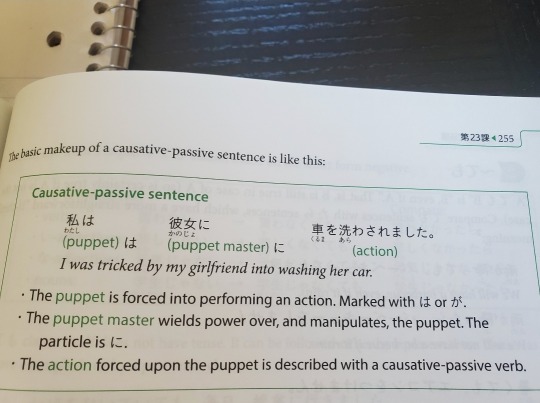
Why is the wording for this so sick
12K notes
·
View notes
Text
Words and phrases with [電] kanji
電気 (でんき) - electricity, light
+ 電気をつける (でんきをつける) - to turn the lights on
+電気を消す (でんきをけす) - to turn the lights off
+電気がつきません (でんきがつきません) - the light doesn't work
電車 (でんしゃ) - train
+電車に乗る (でんしゃにのる) - to get on the train
+電車を降りる (でんしゃをおりる) - to get off the train
電話 (でんわ) - telephone
+電話番号 (でんわばんごう) - telephone number
+電話をかける (でんわをかける) - to make a call
+電話する (でんわする) - to talk on the phone
+電話を切る (でんわをきる) - to hang up
電卓 (でんたく) - calculator
電池 (でんち) - battery
#japanese#langblr#japanese langblr#vocabulary#japanese language#studyblr#japanese vocabulary#learning japanese#vocabulary list#mine
115 notes
·
View notes
Text
Days of the week + time expressions
日曜日 (にちようび) - Sunday
月曜日 (げつようび) - Monday
火曜日 (かようび) - Tuesday
水曜日 (すいようび) - Wednesday
木曜日 (もくようび) - Thursday
金曜日 (きんようび) - Friday
土曜日 (どようび) – Saturday
→ Time expressions:
今日(きょう)- Today
明日(あした)- Tomorrow
あさって - The day after tomorrow
昨日(きのう)- Yesterday
一昨日(おととい)- The day before yesterday
週末(しゅうまつ)- Weekend
週(しゅう)- Week
祝日(しゅくじつ)- National Holidays
前の週(まえのしゅう)- The previous week
次の週(つぎのしゅう)- The next week
今朝(けさ)- This morning
今晩(こんばん)- This evening
来週の火曜日(らいしゅうのかようび)- The next Tuesday
先週の金曜日(せんしゅうのきにょうび)- The last Friday
今年(ことし)- This year
去年(きょねん)- Next year
来年(らいねん)- Last year
今月(こんげつ)- This month
来月(らいげつ)- Next month
先月(せんげつ)- Last month
#japanese#langblr#japanese langblr#vocabulary#japanese language#studyblr#japanese vocabulary#learning japanese#vocabulary list#time expressions#would you add something to the list?#mine
376 notes
·
View notes
